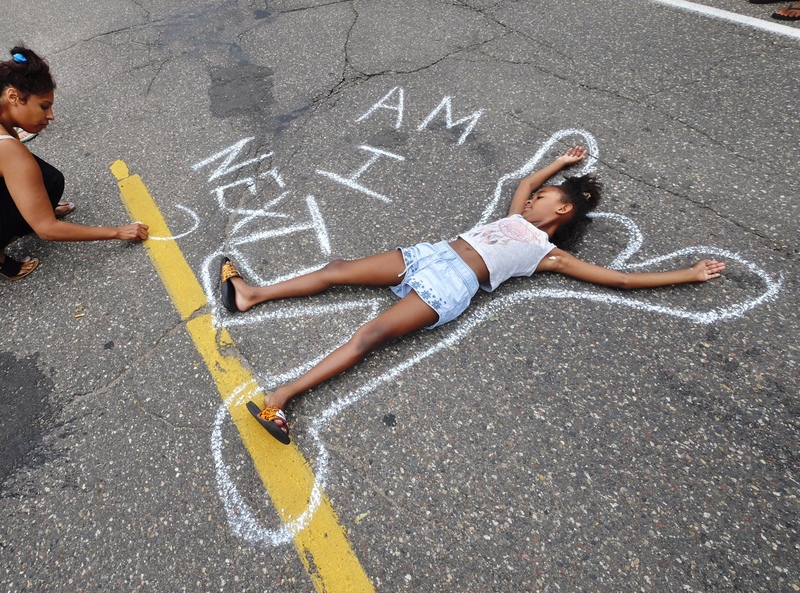
On Wednesday evening, Philando Castile’s life ended in his car as he bled out from five bullet wounds still buckled in his seat following a broken taillight traffic stop gone wrong in Falcon Heights, Minnesota. On Tuesday, Alton Sterling was executed (with six shots in the back) by Baton Rouge police as he lay subdued face down in the pavement. The one-two combo of high profile police killings of black men was notable for its quick succession, but the knock-outs have been coming for a long while now.
Plenty have come in our state, too. In February, Seattle police fired six shots into Che Taylor while two officers yelled contradicting orders of “hands up” and “down on the ground!” Afterwards they said Taylor not only did not comply with their conflicting orders but was reaching for a supposedly holstered gun, and, strangely, detectives waited until they had towed the car to an impound lot to recover the alleged crime gun from the floorboard. Mysteriously, the gun was traced to a King County sheriff’s deputy named Danial Murphy who claimed he bought it three years ago but sold it to another man who says he sold to yet another man. In other words, just another black man dead under suspicious circumstances.
A Seattle Times analysis found that police killed 213 people between 2005 and 2014 in the state of Washington: “In King County, where blacks represent 6.3 percent of the population, they accounted for more than 20 percent of deaths.” 213 killings by Washington police resulted in zero convictions. This has a lot to do with Washington state’s ridiculously lax police lethal force laws that require prosecutors demonstrate both “malice” and a lack of “good faith” on the part of the officer. The Seattle Times reported this has helped set our state apart:
In a June report, “Deadly Force: Police Use of Lethal Force in the United States,” Amnesty International found Washington state’s good faith and malice language stood alone among the 50 states.
“Washington — it’s the most egregious,” said Jamira Burley, an Amnesty International official who handles gun violence and criminal justice issues.

Meanwhile, urbanist advocates like us grapple over minutia of city and transportation planning and things like the Housing Affordability and Livability Agenda (HALA) hoping these changes make a difference in the city and make the city a better place for people of all races to live. Admittedly, some of these goals haven’t resonated as strongly in the African-American community. It’s harder to care about tower massing or Gehl Door Average on a week like this. People have to be alive and not in fear for their lives in order to enjoy the fruits of a livability agenda. All our efforts at high quality transit, multi-modal streets, abundant housing, and place-making will mean a lot less if all people regardless of race don’t have an opportunity to enjoy them and instead live in terror of having their lives snuffed out by police in a case destined to fizzle out in court before justice is served.
Probably the lowest hanging fruit: we must change Washington state law to make it easier to hold officers responsible for misconduct, particularly unwarranted use of lethal force. We also must demand more accountability and civilian oversight in contracts with police unions. If the Philando Castile murder had happened in Seattle, the trigger happy officer who riddled him with bullets would be extremely likely to walk free. We can’t let our laws be this callous and invite such injustice.
Perplexingly, Mayor Ed Murray seems to be moving in the opposite direction. Recently, Murray declined to reappoint Pierce Murphy, a civilian watchdog on the Seattle Police Department’s Office of Professional Accountability. He didn’t make accountability or civilian oversight a focus in his administration’s contract negotiations with the Seattle Police Officers Guild (SPOG), which heavily backed Murray in his 2013 election. When The Stranger obtained and published the details of the negotiations—which both sides had sought to keep secret—Murray retaliated by asking the FBI to hunt down the paper’s source and threatened to hire a private investigator. Thus, Mayor Murray seems more interested in further cozying up with the police guild than in police accountability and transparency.
On a positive note, Mayor Murray did endorse the citizen initiative I-873 which aims to make it less impossible to prosecute police officers who kill in Washington. The initiative’s backers will need to garner 250,000 signatures by the end of the year to appear on the 2017 ballot. It’s a good first step.
We will also have to look to better police training, criminal justice reform, gun control measures, and many more solutions. One thing is for sure: the status quo isn’t working so well.
Doug Trumm is publisher of The Urbanist. An Urbanist writer since 2015, he dreams of pedestrian streets, bus lanes, and a mass-timber building spree to end our housing crisis. He graduated from the Evans School of Public Policy and Governance at the University of Washington in 2019. He lives in Seattle's Fremont neighborhood and loves to explore the city by foot and by bike.


